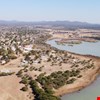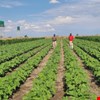
/ Southern Africa
Desenvolvimento do Programa de Ação Estratégico para a Tri-bacia do Buzi, Pungwe e Save (BUPUSA), para desbloquear investimentos transfronteiriços.
Moçambique e o Zimbabué estão a enfrentar corajosamente a escalada dos desafios sociais, económicos e ambientais nas bacias hidrográficas do Buzi, Pungwe e Save. Em 2023, os dois governos lançaram a Comissão dos Cursos de Água do Buzi, Pungwe e Save (BUPUSACOM) ao abrigo de acordos de cooperação alinhados com o Protocolo Revisto da SADC sobre o Curso de Águas Partilhadas de 2000, para liderar uma resposta unida aos desafios que foram intensificados pelas alterações climáticas e pela má gestão dos recursos.

/ Southern Africa
Roadmap towards reversing Biodiversity Loss in the Pungwe River Basin Ecosystems -a lifeline for People, Wildlife, and the Economy
The Pungwe River basin, shared by Zimbabwe and Mozambique, is rich in plant and animal diversity. However, the ecosystem is now under threat from human activities. In 2023, Global Water Partnership Southern Africa (GWPSA) commissioned an Environmental Flow (EFlows) assessment to understand how the Pungwe River Basin and its ecosystems work, the findings of which will help in managing the river and protecting its natural environment.

/ Southern Africa
Transboundary Diagnostic Analysis to unlock investments in the Buzi, Pungwe, and Save River basins
With technical support from the Global Water Partnership Southern Africa (GWPSA), the governments of Mozambique and Zimbabwe have developed a Transboundary Diagnostic Analysis (TDA) for the Buzi, Pungwe, and Save (BUPUSA) River Basins. Upon finalization, the TDA is expected to inform the priorities for unlocking investments for reduction in environmental degradation, reduction in poverty, improved water quality, green and grey infrastructure development, flood control, and improved water governance of the BUPUSA Basins.

/ Southern Africa
Four Southern African countries to Launch A USD 6 million GEF - Funded Transboundary Project for Sustainable Development in the Limpopo River Basin
On Thursday, 14 March, four water ministers from Botswana, Mozambique, South Africa, and Zimbabwe will launch the “Integrated Transboundary River Basin Management for the Sustainable Development of the Limpopo River Basin (UNDP-GEF Limpopo project) to which the Global Water Partnership Southern Africa is providing technical support. The Project will be officially launched in Musina, South Africa.

/ Southern Africa
Strengthening Integrated Transboundary Management of the Limpopo
Alignment and harmonization of individual workstreams as well as counterpart workstreams by all technical partners of the UNDP-GEF Limpopo project is critical to the success of the project. This was the key message that came out of the Integration Workshop for the project “Integrated Transboundary River Basin Management for the Sustainable Development of the Limpopo River Basin,” held on 7-8 February 2024 in a hybrid format coordinated from Pretoria, South Africa. The GEF-funded project is being implemented by United Nations Development Programme (UNDP), with Global Water Partnership Southern African (GWPSA) as the regional executing agency.

/ Southern Africa
Progressos notáveis registados na gestão de cheias e secas em BUPUSA
Os governos de Moçambique e do Zimbabué registaram progressos notáveis na construção de resiliência contra os choques climáticos, incluindo cheias e secas nas Bacias dos Rios Búzi, Pungoé e Save (BUPUSA), partilhadas exclusivamente pelos dois países.

/ Southern Africa
GWPSA supports efforts to accelerate Water, Energy, & Food Nexus Investments at national, transboundary, and multi-country levels
The Global Water Partnership Southern Africa, GWPSA, is providing technical support toward the development of 8 national funding concept notes, 3 transboundary projects, and 2 multi-country funding proposals aimed at accelerating WEF investments in the region.

/ Southern Africa
COP28: Tanzania showcases the Global Water Leadership Programme’s contribution to climate-resilient water resources management
The Global Water Leadership Programme (GWL) in Tanzania has brought together a range of the country’s sectors to forge a united front against water insecurity through regular dialogue and collaboration among stakeholders.

